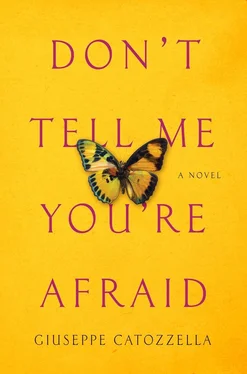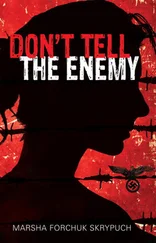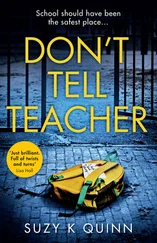Outside the station Aabe was waiting for me.
There was no need for me to say anything; he read it all on my face. I leaped at him, arms around his neck, and covered him with kisses.
On the way back I was obsessed by the idea of running into Al-Shabaab patrols. I used the technique that Hodan had taught me as a little girl, which I had later taught Alì: invisibility. It had always worked. Except for the time with the two boys and Ahmed. It was simple: If you think you’re invisible, Hodan had told me, then you really become invisible. It was the way we went around the city; it was the secret that we’d always used, even Alì and I when we went running at curfew or when we ventured out to the beach when we were little.
Now I used it for me and Aabe. So that the bubble of invisibility might protect us from everything and everyone forever and ever.
It was past eleven when we got home. Everyone had already eaten, but they had kept a plate of kirisho mirish and sweet sesame cakes for me.
Hooyo, crying as usual, said she was proud of me. Even Hodan joined in with Hooyo’s tears, and my other brothers and sisters came up with a song in my honor.
That evening, the night of the victory, everything was perfect.
I was transformed.
For the first time I felt grown up, like an adult. On top of that, I knew I was a champion, and buried somewhere in the pit of my stomach was the conviction that one day I would win the Olympics. And that when that day came, I would indeed lead the resurgence of Muslim women.
I watched my siblings sing as if I were in a bubble of silence. I could see their mouths moving, but I couldn’t hear their voices.
The absence of Alì, his brothers, and Aabe Yassin was palpable. Maybe that’s why my family was more emotional than usual.
Alì, my coach, wasn’t there, and for the first time in my life I wept inconsolably.
Hodan and Hooyo thought I was crying for joy over the victory. No, that night in the courtyard, in front of my entire family celebrating in my honor, I cried because I had grown up and because I missed Alì. The one person in the world who had devoted himself to training me so that I might win the race that I had won that day. And who didn’t even know it.
Before going to sleep I hung the two medals on a nail in the wall beside the mattress. Next to Mo Farah’s face.
Who knows, maybe even Mo could see them.
From Europe, from London. From far, far away.
Who knows, maybe he might decide to send me a note of encouragement for what was to come, for the upcoming race in Djibouti, for instance.
Then, before I dropped off to sleep, Hodan’s velvet voice sang me a wonderful, glorious victory song.

A MONTH LATER, with the unconditional finality with which everything had now started happening in my life, Aabe left us forever. With the swiftness and inevitability with which events were taking place, my guiding light was also gone. One moment everything was as it always was. And the next moment nothing was the same anymore. As of that day, darkness fell.
That morning, as he often did, Aabe had gone to the Bakara market to meet a few friends and do some shopping. Someone, his face concealed, came up behind him and shot him. Just like that, for no reason. An act that only took a moment. Of no consequence to any onlooker, inconspicuous amid all the frenzied hawking and shouting. Given the general indifference, the shadowy figure slipped away without even causing a stir. No one made a move; very few had even noticed.
Bakara was the most dangerous place in the city. Packed with people coming and going at all hours hunting for items to buy and sell, hoping to make a profit or just waste time. Every corner brimming with color — blue, green, red, yellow, white, black — the colors of the fabrics, the spices, the fruits and vegetables. And above all teeming with hands, legs, feet, faces, eyes darting rapidly from this to that, the reek, the odors, the ooze. Littered with spit, banana peels, apple cores, watermelon rinds, the remains of apricots and peaches. That’s Bakara, a hellhole. Because it was so congested, it had always been the most unsafe place.
But until that day it had been the place where other people died. The site of deaths that no one cared about.
The clans’ militiamen, or Al-Shabaab’s men, might place a bomb inside a shopping bag slung over a woman’s back. One would drop the bomb in as he passed by. Then, from a distance away, another one pressed a button. And boom .
Twenty people in one fell swoop. Or thirty.
Children, women, elderly people.
No one gave a damn about it. Activity around the corpses stopped just long enough for everything to go back to normal. It was always someone else who died, someone else who left parents, children, relatives, and friends.
That day, however, that “someone else” suddenly touched us, and death took on its full significance.
That day it was Aabe Yusuf.
Our father.
Gone.
Forever.
After that night Hodan and I no longer slept on our mattresses but in the big bed with Hooyo. Aabe’s body had been laid out on a wooden table covered with a cloth, on view in the courtyard for twenty-four hours, for the public to pay its respects. Our mother spent nearly the entire time standing there welcoming the people who came, her hand in the hand of her dead husband. I, however, didn’t even look at him. I wanted to keep my memory of him intact forever.
Said couldn’t stop crying while Hodan entered into a silence that she broke only at night, in bed.
She slept between me and Hooyo and sang us to sleep with hymns that accompanied Aabe’s Journey, songs that spoke to us with his voice, as if he were with us and were telling us that it was all the fault of the warlords and fundamentalists that he had left us alone. She sang clenching her fists.
We lay hand in hand staring at the ceiling, Hodan in the middle with one hand in mine and the other in Hooyo’s, and as she sang in that strained voice she almost crushed our knuckles.
When we buried him, there was a stream of people with us. Everyone introduced himself as Aabe’s best friend.
Aabe was gone and, like it or not, life had to go on.
His absence in the smallest everyday actions plunged me into a state of furious rage that intensified rather than destroyed my urge to run and to win. What’s more, it made me invincible and unassailable. Nothing could ever hurt me anymore. They had already taken Aabe from me; no one could ever again find fault with what I did.
My grief was so great that I did not fear the worst. Often as I ran, I found myself crying like mad. When I came home and he wasn’t sitting in the courtyard, I burst into sobs. In the evening, after dinner, we missed his deep voice and his jokes. Said tried, but the void seemed even more painful.
In those days and weeks I felt an obligation to complete what I had started in the name of the invincibility that Aabe had bestowed on me. Sometimes as I ran, my mind wandering on its own, I caught myself imagining the most absurd, unthinkable things: that Aabe had been taken from us just to allow me to run freely, protected by his death, which had brought vengeance to our family.
But as soon as I stopped and pulled myself together, I realized that I was just being foolish.
The world had lost its colors, its scents, its sounds. From that day on, everything was dulled, murky, like the wax of Alì’s face that morning. It was as if I had entered an endless tunnel, the space between its walls barely wider than me, and all I could do was run, run as fast as I could, looking for a way out.
Читать дальше





![Ally Carter - [Gallagher Girls 01] I'd Tell You I Love You But Then I'd Have to Kill You](/books/262179/ally-carter-gallagher-girls-01-i-d-tell-you-i-lo-thumb.webp)







